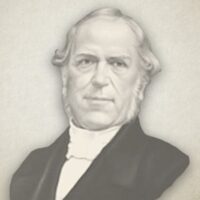
Chapter 4—On Baptism, Answering The Charge Of Inappropriateness
Mr. Bridgman: “I should say to the preacher concerned in this censure, my brother, let us do to others as we would they in like circumstances should do to us. And as a Baptist (so called) would not have patience to hear a Pseudo-Baptist rant on a general occasion about infant sprinkling; so neither vice versa.”
My Reply:
What have I done, but honestly spoken out principle at a proper place, occasion, and time? It was a Baptist ordination, and I was published to state sentiments according to my well known public profession and personal belief, and I did so, and will leave the public to judge if I should not have departed from the laws of honesty on such an occasion if I had not done so. I spoke pointedly on believers’ baptism, because it was a particular occasion for such statements to be made; but you call it a general occasion. But if an ordination be a general occasion, pray what in all our lives is a public particular one? And if we may not speak out our sentiments at an ordination, when may we speak them? Say, not at all, because while they are opposed they cannot be refuted; nor oppose infant sprinkling, because though so lovely, it cannot by one text in the Scriptures be supported; nor can the unbaptized of God’s flock be directed to search them to find it there before they embrace it, without great danger and liability of their being to the very contrary convinced of believers’ baptism in doing so. Ah! that is it, and I shall believe that I have now hit the nail on the head, until the contrary be proved.
If we go to an Anti-Baptist ordination we expect to hear them speak out plainly all their leading sentiments, and especially those which more particularly distinguish them as a denomination, because it is a most particular occasion for doing so, and if they do not so speak out, we conclude they do not act honestly to the occasion. And when you go to a Baptist ordination, do not be offended if they speak out plain, but reckon them not to act honestly, but with some subtle design, if they do not so speak; for truth demands to be frankly told, and fears nothing but silence, secrecy, and cowardice, in its professed advocates. And when a preacher comes forth with excellency of speech and enticing words of man’s wisdom, 1 Cor. 2:l, 4, and is not plain and open in sentiment, it is to be feared that he is seeking the praise of man more than the praise of God, or that he aims to please the multitude more than to feed the flock of God, or that he suspects the truth of his own sentiments, or that he does not sufficiently understand his own sentiments to make them plain to others, or that the subject in hand is not of that vital importance to himself to induce him to wish other people to understand it as well as himself, or that he has some other motive than that of promoting the knowledge of the truth in that simplicity in which the truth is in Jesus, 2 Cor. 1:12. Eph. 4:21. The sun is not ashamed to shine, and an honest man is not ashamed to walk in the light thereof, but a thief covets darkness, and a hypocrite a mask.
John Foreman (1792-1872) was a Strict and Particular Baptist preacher. He was appointed the Pastor of Hill Street Chapel, Marylebone, serving this position for close to forty years.
JOHN FOREMAN'S LIFE AND MINISTRY
JOHN FOREMAN ON DUTY FAITH (COMPLETE)
JOHN FOREMAN'S BAPTISM AND COMMUNION CONSIDERED (COMPLETE)




